by James Scott Bell
@jamesscottbell
You know me. I love popping the hood on story and looking at all the moving parts. Mainly because I want to build the best story engine I can, but also to teach it. Which means getting greasy and messing around. Today, I want to examine a beat from mythic structure—Refusal of the Call to Adventure. I haven’t given this a lot of thought in the past, but recently I’ve noticed it more and more in classic movies and decided to give it some study.
The Hero’s Journey begins in an ordinary world with the hero receiving a Call to Adventure—by way of invitation, yearning, temptation, or message. But the hero initially refuses. Only later will he be thrust over the Threshold (what I call The Doorway of No Return) into the “special world.”
So what’s the point of this beat? As my friend and teaching colleague Chris Vogler explains in his essential guide The Writer’s Journey:
The halt on the road before the journey serves an important dramatic function of signaling the audience that the adventure is risky. It’s not a frivolous undertaking but a danger-filled, high-stakes gamble in which the hero might lose fortune or life.
In other words, it gives the reader the sense that death—physical, professional, or psychological—is truly on the line once the hero enters Act 2.
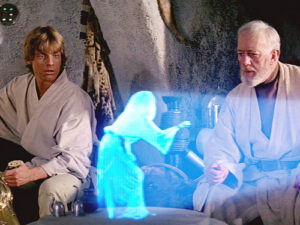 For example, Luke Skywalker sees the hologram from Princess Lea pleading for help from Obi-Wan Kenobi. Luke wonders if that could mean “old Ben Kenobi.” A bit later Luke finds Ben and sure enough he is Obi-Wan. Ben views Lea’s entire message, pleading with him to come help in the fight against the Empire. Ben then calls on Luke to join the adventure, but Luke refuses:
For example, Luke Skywalker sees the hologram from Princess Lea pleading for help from Obi-Wan Kenobi. Luke wonders if that could mean “old Ben Kenobi.” A bit later Luke finds Ben and sure enough he is Obi-Wan. Ben views Lea’s entire message, pleading with him to come help in the fight against the Empire. Ben then calls on Luke to join the adventure, but Luke refuses:
BEN
You must learn the ways of the Force
if you’re to come with me to Alderaan.
LUKE
Alderaan? I’m not going to Alderaan.
I’ve got to go home. It’s late, I’m
in for it as it is.
BEN
I need your help, Luke. She needs
your help. I’m getting too old for
this sort of thing.
LUKE
I can’t get involved! I’ve got work
to do! It’s not that I like the
Empire. I hate it! But there’s nothing
I can do about it right now. It’s
such a long way from here.
BEN
That’s your uncle talking.
LUKE
Oh, God, my uncle. How am I
ever going to explain this?
BEN
Learn about the Force, Luke.
LUKE
Look, I can take you as far as
Anchorhead. You can get a transport
there to Mos Eisley or wherever you’re
going.
BEN
You must do what you feel is right,
of course.
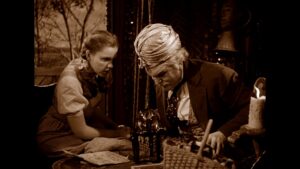 Another example: In The Wizard of Oz Dorothy is called to adventure by her yearning to find a place where there is no trouble. So she runs away as a first step. But then she meets Professor Marvel. He figures out what’s going on and uses an emotional ploy to get Dorothy to refuse the call. He looks at his crystal ball and pretends to see an old woman in a polka dot dress. “Why she’s crying. Someone has hurt her. Someone has just about broken her heart.” That gets to Dorothy, and she returns to the farm. [In mythic terms, Professor Marvel is a character known as The Mentor, who often appears in Act 1 as the conscience of the Hero.]
Another example: In The Wizard of Oz Dorothy is called to adventure by her yearning to find a place where there is no trouble. So she runs away as a first step. But then she meets Professor Marvel. He figures out what’s going on and uses an emotional ploy to get Dorothy to refuse the call. He looks at his crystal ball and pretends to see an old woman in a polka dot dress. “Why she’s crying. Someone has hurt her. Someone has just about broken her heart.” That gets to Dorothy, and she returns to the farm. [In mythic terms, Professor Marvel is a character known as The Mentor, who often appears in Act 1 as the conscience of the Hero.]
In both these examples the refusal of the call is related to duty. Specifically, familial duty.
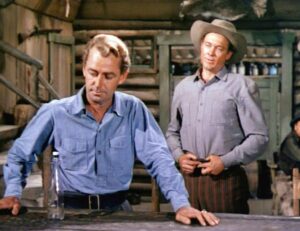 Another form of duty is professional. In my favorite movie of all time, Shane (1953), the mysterious gunfighter fleeing his past takes a job working for homesteader Joe Starrett. Starrett instructs Shane to avoid trouble in town where the cattle men hang out in the saloon. The first time Shane shows up he’s tagged and shamed by one of the cowboys. It’s a call to fight back. But Shane refuses the call because of his pledged duty to his benefactor. For this he is labeled a coward by the other homesteaders. Knowing he has to overcome this for the benefit of the community, he later answers the call by giving his tormentor a thumping. He is then set upon by the entire gang—until Joe joins the fight and helps Shane beat them all up. That puts them both across the Threshold and in the crosshairs of death.
Another form of duty is professional. In my favorite movie of all time, Shane (1953), the mysterious gunfighter fleeing his past takes a job working for homesteader Joe Starrett. Starrett instructs Shane to avoid trouble in town where the cattle men hang out in the saloon. The first time Shane shows up he’s tagged and shamed by one of the cowboys. It’s a call to fight back. But Shane refuses the call because of his pledged duty to his benefactor. For this he is labeled a coward by the other homesteaders. Knowing he has to overcome this for the benefit of the community, he later answers the call by giving his tormentor a thumping. He is then set upon by the entire gang—until Joe joins the fight and helps Shane beat them all up. That puts them both across the Threshold and in the crosshairs of death.
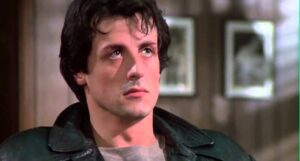 Still another form of refusal comes from self-doubt or fear. A famous example is Rocky. Pug fighter Rocky Balboa is given an incredible call to adventure—the chance to fight the heavyweight champion of the world!
Still another form of refusal comes from self-doubt or fear. A famous example is Rocky. Pug fighter Rocky Balboa is given an incredible call to adventure—the chance to fight the heavyweight champion of the world!
Rocky immediately says, “No.” When asked why, he explains, “I’m really a ham-and-egger. This guy is the best. It wouldn’t be such a good fight.” In this way the stakes are set at the highest level before Rocky takes on the challenge.
I had an email conversation with Chris about all this, and he added another form of refusal (reprinted by permission):
Here’s another major category that can trigger refusal of the call: Bitter Experience. This is why hard-boiled detectives often turn down the case at first. They intuitively know that the investigation will lead them into dangerous places where they came close to death or somebody they cared about was killed. You also find this in comedies like the Hope-Crosby road movies where they are both wary of getting roped into the other’s schemes which have proved so dangerous in the past. In a romance, broken-hearted people are reluctant to open up to love again.
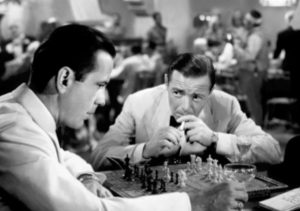 The prime example of Bitter Experience is Casablanca. Rick Blaine had his heart shattered when the woman he loved, Ilsa Lund, abandoned him in Paris just before the Nazi occupation. He has set up shop in Casablanca to forget her. His café is allowed to operate because he takes no sides in the war. His Call to Adventure comes when Ugarte, the scheming rat who murdered German couriers to obtain the valuable Letters of Transit, begs Rick to hide him from the police. Rick refuses with the classic line, “I stick my neck out for nobody.”
The prime example of Bitter Experience is Casablanca. Rick Blaine had his heart shattered when the woman he loved, Ilsa Lund, abandoned him in Paris just before the Nazi occupation. He has set up shop in Casablanca to forget her. His café is allowed to operate because he takes no sides in the war. His Call to Adventure comes when Ugarte, the scheming rat who murdered German couriers to obtain the valuable Letters of Transit, begs Rick to hide him from the police. Rick refuses with the classic line, “I stick my neck out for nobody.”
Overcoming the Refusal
So the hero has refused to answer the call. Something, then, has to happen to push the hero over the Threshold (through the Doorway).
In Star Wars Luke’s aunt and uncle are killed by Imperial stormtroopers. Thus, the familial duty is removed and Luke has reason and opportunity to join the Rebellion.
Or the hero herself can be removed from the duty. Dorothy is literally taken up and away from Kansas and deposited in Oz.
In Casablanca (Bitter Experience) Ilsa shows up at Rick’s café with her husband, the freedom fighter Victor Laszlo. In this way Rick is forced over the Threshold because his ordinary world has been changed to a special world (not his choice!) for now he must deal with his conflicted emotions and decide whether to help Isla and Victor or remain aloof.
 A refusal out of fear or self-doubt must be overcome with a strong emotional jolt. In Finding Nemo, Marlin, Nemo’s father, is afraid of the open ocean because of a past traumatic event—a barracuda attack that killed his wife, Cora, and most of their eggs. He is therefore overprotective of his surviving son, Nemo. Nemo keeps calling his father to adventure—exploring the sea, finding a sea turtle, etc. But Marlin refuses. He is full of fear and self-doubt about his ability to protect his son.
A refusal out of fear or self-doubt must be overcome with a strong emotional jolt. In Finding Nemo, Marlin, Nemo’s father, is afraid of the open ocean because of a past traumatic event—a barracuda attack that killed his wife, Cora, and most of their eggs. He is therefore overprotective of his surviving son, Nemo. Nemo keeps calling his father to adventure—exploring the sea, finding a sea turtle, etc. But Marlin refuses. He is full of fear and self-doubt about his ability to protect his son.
So what emotional jolt forces him into the dark world of the open ocean? Nemo is captured by scuba divers! Marlin has no choice, he must find Nemo! There is familial duty once again—perhaps the strongest of all emotions—only this time it’s the stimulus to cross the Threshold. If we didn’t have the refusal as a way of understanding the source of Marlin’s fears, the subsequent journey would not have as much depth.
The Refusal of the Call is useful tool for story construction. Because it happens early—somewhere in Act 1—you can pants it or plan it. Once you have it, though, it will tell you a lot about your main character and provide fodder for backstory material.
Some questions to ask:
- What reason does my Lead have to resist the call to adventure? Is there duty involved? Family ties? Or is it more a matter of fear, self-doubt, or bitter experience?
- What were the pre-story circumstances that gave rise to this refusal? Was there a traumatic event that haunts my Lead in the present? Was my Lead’s heart broken?
- What event is strong enough to overcome the Lead’s refusal? How can you increase the emotional level of this event?
Let the journey begin.

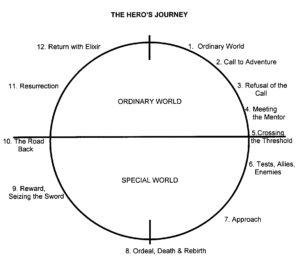
Happy Sunday, and thanks for the meaty breakfast. My editor has promised her feedback on the current WIP this morning, so I’m going to come back to this when I start the next book. I tend to use a “what will it take to make them do that?” approach as I plants my way through the first draft.
Terry, may my post be some plants food.
Thanks for another great teaching moment, Jim. Looking at the Refusal and the event that leads to the first Doorway, i.e. linking them by motivation (versus treating them as two unrelated events) gives an “emotional jolt.” Wonderful. This is why I check in every Sunday morning.
Have a great remainder of the weekend.
You nailed the meaning of it, Steve. Nice!
Jim, posts like this are the reason I faithfully followed TKZ, years before I was privileged to become a contributor.
My ten practice novels (I’m a slow learner) were never published b/c I didn’t understand foundational concepts like call to action, refusal, and the doorway of no return.
I often put those steps in the wrong order which made the story clunky. For example:
I used to think the best way to grab a reader was to open with a dead body on page 1. That’s action, right?
However, it doesn’t necessarily work b/c the reader doesn’t yet know the victim and why their death matters, who the hero is and why he or she should be involved, or what the stakes are if he or she doesn’t answer the call to action.
Once I realized the importance of refusing the call, the puzzle pieces fell into place.
Thanks to you, Jim, (and Jordan Dane, Kris Montee, Larry Brooks, and Chris Vogler) for dragging me through the doorway of no return into the “special world” of mythic structure.
Ah, Debbie, you embody the Writer’s Journey itself…you crossed the Threshold and met many challenges in the “special world.” Mentors showed up when you need them, and the journey continued….and continues still. Now here you are, at TKZ, with Elixir to share. Perfect!
I also love to learn here too. It also makes me venture out on the internet and do more research.
At least one famous work opens in exactly that way. A bit of establishing information, then the body. Can you guess the one I’m thinking of?
Sunset Boulevard.
I love this story structure!
Funny–it all sounds so simple when you see it explained, but is always a lot harder when you’re trying to structure your actual story idea. 😎
Right on, BK. It’s like watching a video of a perfect golf swing, but when you get to the course…
And that’s where practice comes in. I like what Coach Bob Knight used to say: “Practice doesn’t make perfect; perfect practice makes perfect.” IOW, you can’t just type and type (practice) if you’re making fundamental mistakes. But if you include instruction and study that makes the practice a source of growth.
IOW, you can’t just type and type (practice) if you’re making fundamental mistakes–that’s what I did for years. I had no one to tell me things like head-hopping was a no-no or show, don’t tell…then people like the authors at TKZ came along and I started getting it. Thank you!
That’s exactly why we’re here, Patricia!
I love checking in on Sunday morning because I always learn something new to add to the collection of writing gems. I appreciate your including the examples. Having just finished and released my third novel, I’ve been thinking of what I want to try in the next one, and you’ve given me some inspiration. Thanks!
Speaking of mythic journeys, I immediately thought of Odysseus who feigned madness to avoid fighting the Trojan War. If I remember correctly, it was because he wanted to stay with his family. It didn’t work for him either.
Love reference to the classics, Kay.
A student essay once stated, “The Iliad and The Odyssey were not actually written by Homer, but by another man of the same name.”
good one. 🙂
Did Catch 22 apply to the Trojan War?
When you talk about Star Wars, I go back to the five-year-old kid I used to be.
Today’s post also made me think about my career. I have had job offers I didn’t want to take, but eventually did. One was in the Middle East, and a few others on this side of the world were going to damage my professional reputation if I failed. Everything worked out fine for me, but when you’re put on the spot, the pressure to perform goes up significantly.
Plain and simple, if you (or your main character), are being sought, the “death” stakes go through the roof. No one wants to leave their comfort zone unless they’re bored out of their mind.
Exactly, Ben. The “ordinary world” is comfy. If death is on the other side of the door, no one wants to go through it just to relieve boredom. Except maybe Ishmael:
Whenever I find myself growing grim about the mouth; whenever it is a damp, drizzly November in my soul; whenever I find myself involuntarily pausing before coffin warehouses, and bringing up the rear of every funeral I meet; and especially whenever my hypos get such an upper hand of me, that it requires a strong moral principle to prevent me from deliberately stepping into the street, and methodically knocking people’s hats off—then, I account it high time to get to sea as soon as I can.
The Mad Magazine parody of Moby Dick opens with the great line: “Call me Fish-meal.”
Mad satires were the best. My two favorites were Voyage to See What’s on the Bottom; and Hack, Hack Sweet Has-Been.
This is fantastic deconstruction of a crucial step in the Hero’s Journey, one which I knew about, but didn’t really “grok” until you laid it out in this post. Like Debbie, your posts on plot and structure drew me to KZB years ago, and really helped level up my writing. It’s one reason I consider you to be one of my writing mentors. Reading your books on craft is the other 🙂
Understanding structure really unlocked story telling for me–the mirror moment is another example.
Now I feel like I could tackle the hero’s journey, thanks to you filling in a crucial piece that I had previously not paid enough attention to. My cozy is the heroine’s journey (as laid out by Gail Carriger in her 2020 book), as was my Empowered series.
Thanks for all the help, Jim! Have a wonderful Sunday.
And thanks for the reference to Stranger in a Strange Land, Dale. There really is an inherent power in myth, and it’s great that we can tap into it ourselves when we get to know it…all for the benefit of our readers.
Wow, Jim. Outstanding teaching this morning. As I read, I thought about my WIP. Sure enough, I do have a refusal (familial refusal). Amazing! I’m all fired up now. Happy Sunday! Thank you! I’m diving back in…
Isn’t that great, Sue? I love it when those things “show up” in our writing. It shows we have internalized story beats that come out naturally.
Wow, Jim, this is a great post! So much to pick apart and use. The examples are wonderful.
I have disheartening news for you: “I’ve never watched Shane“, Deb says with scarlet-tinged cheeks.
*Gulp*
Searching my streaming device now…
Happy Sunday to you!
Ah, Deb, a treat awaits you. I had the good fortune to see SHANE in its full big screen glory recently. It is totally magnificent visually. It loses something on a smaller screen, but the mythic structure—and Alan Ladd—make it immortal.
You broke that segment of the hero’s journey down to bite-size pieces, Jim. Refusing the Call to Adventure applies to all of us at any point in our lives. How many of us wonder what our lives would look like today if we had refused a specific call? Maybe we’d have spent years pursuing a different career. Perhaps we did choose to refuse one call. Do we ever stop to ponder where that unlived adventure could have taken us? Loved this post!
Yes, Suzanne, that’s why this template is so powerful. It is how we live our lives, if we so choose the hero’s journey.
If it’s any consolation, something in us won’t let us take adventures we’re not ready for. I have regrets, but, realistically, I’d have brought myself into those relationships long before I healed from my past.
Thanks, Jim. Very interesting. That’s the very thing that gets the John Wick film franchise going. Quick declines an assassin assignment and is attacked, which results in his dog being killed. Wick retaliates and never stops over the course of three funds and counting. Boom!
Loyalty to dog…that works every time.
Nicely described. I worked with mythic structure in graduate school, and it really informed my own writing.
If you really want to go down the rabbit hole of mythic structure, I strongly recommend Northrup Frye’s ANATOMY OF CRITICISM.
I’ve heard of Frye. Maybe I’ll check that out sometime. Thanks.
Underlying The Refusal is a primary principle of story, one that applies to all the stages of the Journey:
Maximize tension.
By refusing the Call, the MC creates tension. The audience/ readers are tantalized. They know (or jolly well should know) the importance of the Adventure. They’re practically jumping up and down, yelling, “GO, you ijjit!!”
If the Hero is told he needs to go to Alderaan and find the Maltese Pterodactyl, and he just says “Well, okay,” a major opportunity for tension is totally lost.
That said, there’s no absolute need for a refusal. In a short film, it may be absent or it may be brief–the MC hears the Call, his eyes open wide, he turns on his heel, silently walks away. The mentor, or whoever issued the Call, runs after him and convinces him to go. The tension will be correspondingly short, but it will be there, and the viewers’ emotions will have been affected. This may even constitute a “moment.”
Even more to the point, the audience wonders if the hero has the intestinal fortitude to go.